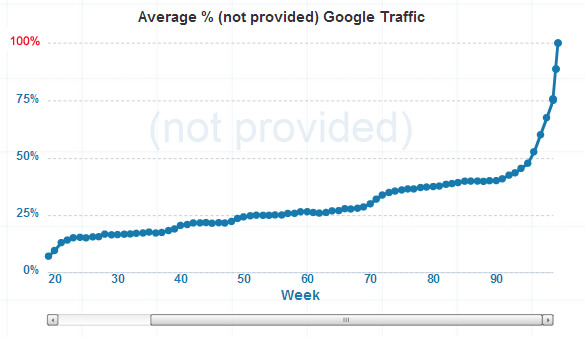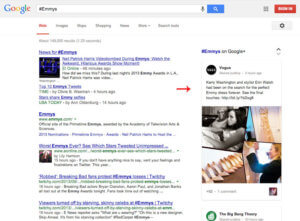After a gradual decline in keyword data over the past two years, Google has finally pulled the plug, deeming all keyword data ‘not provided’. What may be seen as a huge blow to some can be considered an advantage for companies with the right technology.

Not Provided Data Google Analytics
In an effort to make search ‘more secure’ Google is now encrypting all searches. This means that keyword data from Google organic will no longer be passed on in Google Analytics, or any other analytics platform.
Titan Growth’s president Danny Shepherd had this to say about the recent change.
“This will affect the way we track keywords and will change the playing field for SEO in general. Over the last two years, Titan Growth has invested heavily in new proprietary technology that will still allow us to get the data we need to track keyword rankings on an individual level for our clients.”
A background on encrypted search
The encrypted search initially launched in 2010, where users had the option to search securely on a different URL. A year later in 2011, Google began encrypting searches for all users who were logged into their Google accounts, which commenced the infamous ‘not-provided’ data in Google Analytics. Now, Google has officially begun redirecting all searchers to secure search, meaning that 100% of keyword search queries in Analytics will be ‘not-provided’.
When asked about the change, Google responded:
“We added SSL encryption for our signed-in search users in 2011, as well as searches from the Chrome Omnibox earlier this year,” a Google spokesperson told Search Engine Watch. “We’re now working to bring this extra protection to more users who are not signed in.”
As a user, the only difference you may or may not notice is being redirected to https://www.google.com anytime you search on Google, meaning that you are searching on a secure server. For SEO’s though, it means quite a bit more.
How will this affect SEO?
The steady decline in keyword data since 2011 has been a warning signal to SEOs to prepare for the day when all keyword data would finally be withheld. Unfortunately, that day was yesterday and SEO’s will now be in the dark about their keyword data. Will this make SEO reporting more difficult? Probably. Will it throw a wrench in SEO overall? No, in fact, this could be considered an advantage for agencies like Titan Growth that have the technology and know-how to work around these new changes.
While tying traffic increases and conversions to keywords will be that much more difficult, it will not be impossible to do. SEOs will now be forced to use alternate methods and expend more resources to dig up information that was once readily available. This change, while annoying, won’t have a colossal impact on good SEO companies who are able to evolve. Titan Growth’s proprietary TitanBOT technology will continue to allow Titan Growth to track, monitor and report on keyword rankings as well as a number of other metrics no longer available in Google analytics.
What happens now?
In the coming days and weeks, as Google continues to roll out encrypted search worldwide, webmasters will see the percentage of ‘not-provided’ increase until keyword data is completely eradicated. We’ll see a shift in methods used to obtain keyword data, with more webmasters turning towards Webmaster Tools, Paid vs. Organic reporting in AdWords and Bing to mine data.
While a lack of keyword data will provide a challenge for some SEO’s, specifically those who were underprepared for this change, resilient companies will take it in stride. Seeing keyword data shift completely to ‘not-provided’ will likely be detrimental to some SEOs and companies, but will open the door for change and new opportunities to succeed for those who were prepared.
If you have any questions about how this will affect your SEO strategy, or would like to learn how Titan Growth’s technology can help you to continue to track keyword rankings and traffic, please fill out the form below:
Submitted by Erica Machin, Titan Growth




